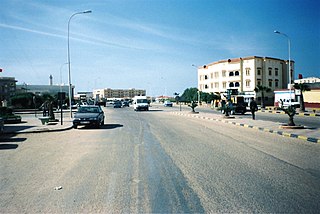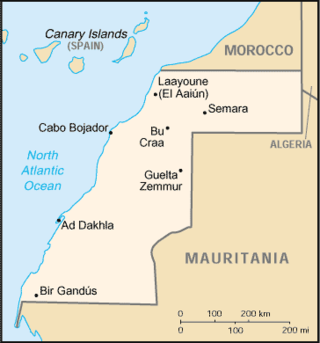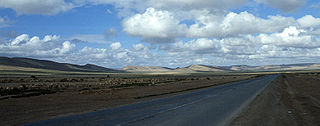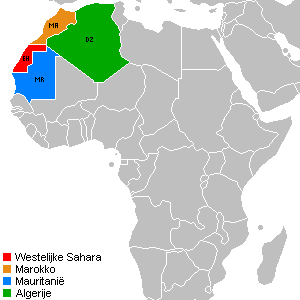
The United Nations Mission for the Referendum in Western Sahara is the United Nations peacekeeping mission in Western Sahara, established in 1991 under United Nations Security Council Resolution 690 as part of the Settlement Plan, which had paved way for a cease-fire in the conflict between Morocco and the Polisario Front over the contested territory of Western Sahara.

United Nations Security Council resolution 1495, adopted unanimously on 31 July 2003, after recalling all previous resolutions on the situation in Western Sahara, particularly Resolution 1429 (2002), the Council extended the mandate of the United Nations Mission for the Referendum in Western Sahara (MINURSO) until 31 October 2003 and supported the Baker Plan put forth by James Baker III, who was at that time the Special Representative for Western Sahara of the Secretary-General Kofi Annan, as a replacement of the 1991 Settlement Plan. The resolution, adopted after significant changes to the original draft, was welcomed by the Polisario Front, which supported the Baker Plan, but not by Morocco, which resisted it.

United Nations Security Council Resolution 1675, adopted unanimously on April 28, 2006, after recalling all previous resolutions on the situation in Western Sahara, including resolutions 1495 (2003), 1541 (2004) and 1634 (2005), the Council extended the mandate of the United Nations Mission for the Referendum in Western Sahara (MINURSO) until October 31, 2006.

United Nations Security Council Resolution 1720, adopted unanimously on October 31, 2006, after recalling all previous resolutions on the situation in Western Sahara, including resolutions 1495 (2003), 1541 (2004) and 1675 (2006), the Council extended the mandate of the United Nations Mission for the Referendum in Western Sahara (MINURSO) for six months until April 30, 2007.

United Nations Security Council Resolution 1754, adopted unanimously on April 30, 2007, after recalling all previous resolutions on the situation in Western Sahara, the Council extended the mandate of the United Nations Mission for the Referendum in Western Sahara (MINURSO) for six months until October 31, 2007.

United Nations Security Council resolution 1163, adopted unanimously on 17 April 1998, after reaffirming all previous resolutions on the Western Sahara, the Council extended the mandate of the United Nations Mission for the Referendum in Western Sahara (MINURSO) until 20 July 1998 so that it could proceed with voter identification tasks.

United Nations Security Council resolution 1198, adopted unanimously on 18 September 1998, after reaffirming all previous resolutions on the Western Sahara, the Council extended the mandate of the United Nations Mission for the Referendum in Western Sahara (MINURSO) until 31 October 1998.

United Nations Security Council resolution 1204, adopted unanimously on 30 October 1998, after reaffirming all previous resolutions on the question of the Western Sahara, the Council extended the mandate of the United Nations Mission for the Referendum in Western Sahara (MINURSO) until 17 December 1998.
United Nations Security Council resolution 1215, adopted unanimously on 17 December 1998, after reaffirming all previous resolutions on the question of the Western Sahara, in particular Resolution 1204 (1998), the Council extended the mandate of the United Nations Mission for the Referendum in Western Sahara (MINURSO) until 31 January 1999 to allow for further consultations between parties.

United Nations Security Council resolution 1232, adopted unanimously on 30 March 1999, after reaffirming all previous resolutions on the question of the Western Sahara, the Council extended the mandate of the United Nations Mission for the Referendum in Western Sahara (MINURSO) until 30 April 1999.

United Nations Security Council resolution 1342 was adopted unanimously on 27 February 2001. After recalling all previous resolutions on Western Sahara, in particular resolutions 1108, 1292, 1301,1309 and 1324, the Council extended the mandate of the United Nations Mission for the Referendum in Western Sahara (MINURSO) until 30 April 2001.

United Nations Security Council resolution 1380, adopted unanimously on 27 November 2001, after reaffirming all previous resolutions on Western Sahara, including Resolution 1359 (2001), the Council extended the mandate of the United Nations Mission for the Referendum in Western Sahara (MINURSO) until 28 February 2002.

United Nations Security Council resolution 1429, adopted unanimously on 30 July 2002, after recalling all previous resolutions on the situation in Western Sahara, particularly resolutions 1359 (2001) and 1394 (2001), the Council extended the mandate of the United Nations Mission for the Referendum in Western Sahara (MINURSO) for six months until 31 January 2003.

United Nations Security Council resolution 1463, adopted unanimously on 30 January 2003, after recalling all previous resolutions on the situation in Western Sahara, particularly Resolution 1429 (2002), the Council extended the mandate of the United Nations Mission for the Referendum in Western Sahara (MINURSO) for two months until 31 March 2003.

United Nations Security Council resolution 1485, adopted unanimously on 30 May 2003, after recalling all previous resolutions on the situation in Western Sahara, particularly Resolution 1429 (2002), the Council extended the mandate of the United Nations Mission for the Referendum in Western Sahara (MINURSO) for two months until 31 July 2003.

United Nations Security Council resolution 1523, adopted unanimously on 30 January 2004, after recalling all previous resolutions on the situation in Western Sahara, particularly Resolution 1495 (2003), the Council extended the mandate of the United Nations Mission for the Referendum in Western Sahara (MINURSO) until 30 April 2004.

United Nations Security Council resolution 1570, adopted unanimously on 28 October 2004, after recalling all previous resolutions on the situation in Western Sahara, particularly resolutions 1495 (2003) and 1541 (2004), the Council extended the mandate of the United Nations Mission for the Referendum in Western Sahara (MINURSO) until 30 April 2005.

United Nations Security Council resolution 1598, adopted unanimously on 28 April 2005, after recalling all previous resolutions on the situation in Western Sahara, including resolutions 1495 (2003), 1541 (2004) and 1570 (2004), the Council extended the mandate of the United Nations Mission for the Referendum in Western Sahara (MINURSO) until 31 October 2005.

United Nations Security Council Resolution 1634, adopted unanimously on 28 October 2005, after recalling all previous resolutions on the situation in Western Sahara, including resolutions 1495 (2003), 1541 (2004) and 1598 (2005), the Council extended the mandate of the United Nations Mission for the Referendum in Western Sahara (MINURSO) until 30 April 2006.

United Nations Security Council Resolution 1979, adopted unanimously on April 27, 2011, after reaffirming all previous resolutions on the Western Sahara including 1754 (2007), 1783 (2007), 1813 (2008), 1871 (2009) and 1920 (2010), the Council discussed prospects for a settlement of the dispute and extended the mandate of the United Nations Mission for the Referendum in Western Sahara (MINURSO) until April 30, 2012.

















